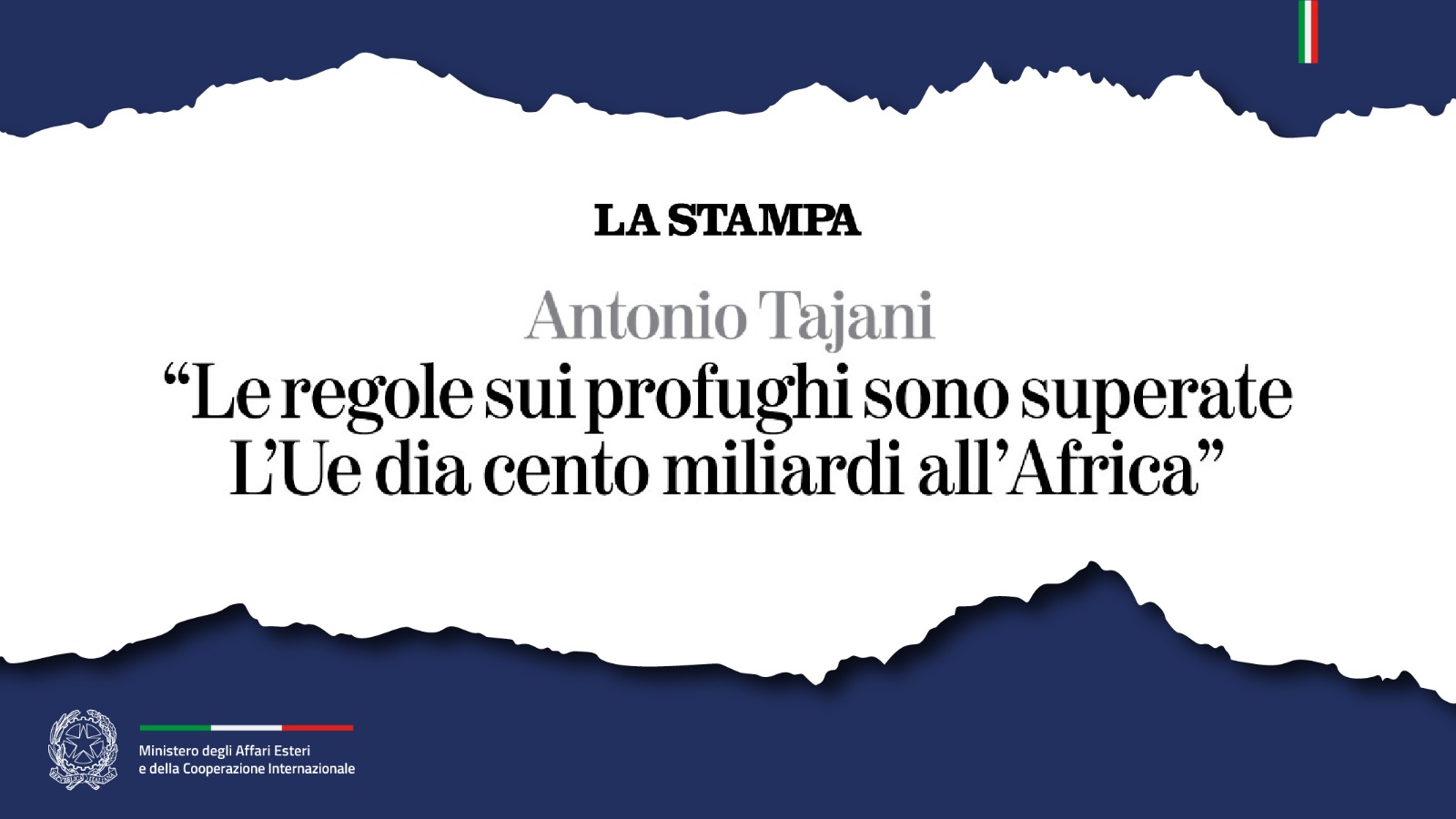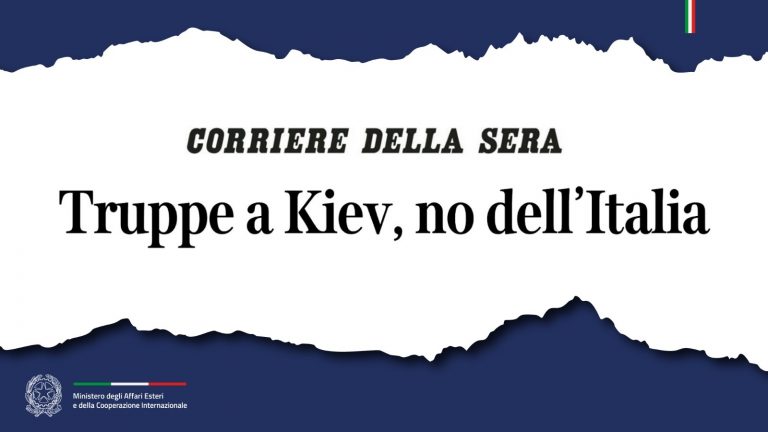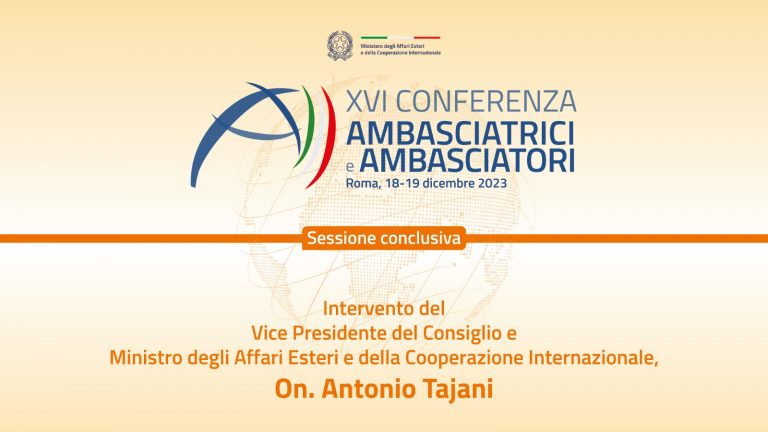Minister Tajani, was it right to trigger a diplomatic incident with a strategic ally like France at such a sensitive time?
“Italy didn’t create any diplomatic incident, neither with Germany initially nor with France later. We raised a problem of compliance with the rules. Immigration can only be resolved at the European level. There are two fronts: the Balkans and North Africa”.
Are you and President Mattarella working to extinguish the arguments that were also fuelled by some members of the majority?
“President Mattarella is performing his role and I’m performing mine, that of minister. There’s nothing out of the ordinary. But the question with France is closed”.
What can be done? “The Dublin Treaty seems to be out of date. So we need to find new rules – and quickly – to combine reception and the defence of Europe’s borders. I said as much to my EU colleagues the other day, in Brussels”.
What was their reply?
“I didn’t say ‘Germany needs to take in a thousand, Belgium 200 and Cyprus 50’. I raised a strategic question. And we need to act more quickly”.
What strategy are you thinking of?
“While we’re trying to resolve the problem of the 90,000 migrants who have arrived in Italy, we mustn’t lose sight of the broader question: the stability of the Balkans and of Africa. The projections tell us that there will be three billion Africans in 2050 and we need to act in such a way that their material conditions improve. It’s obvious that people who have nothing to eat will escape elsewhere”.
Concrete measures?
“Europe needs to provide at least 100 billion, to be spent with a strategy. Italy needs to take on a decisive role in this, and strengthen our presence in North Africa, the Balkans and South America”.
Is Italy isolated in Europe?
“The meetings I’ve had show the opposite. And Bali is further proof that it’s not true”.
Meloni’s bilateral with Xi Jinping placed the Silk Road back on centre stage. Is the plan still frozen?
“I’ve always had my doubts. After all, China is an interlocutor, but also a competitor. We have different views on human rights and trade, but the Chinese aren’t enemies”.
Italy seems to be more closely linked than ever to the United States. Is that the case?
“I had a long, very positive – and indeed warm – meeting with Secretary of State Antony Blinken. And Biden’s meeting with Meloni seemed to me to go extremely well. I found nothing but openness to this government”.
How did you manage the crisis over the missile that landed in Poland?
“We showed that we have sound nerves. We were in contact with everyone but we didn’t make any statements or comments until the incident had been clarified”.
Is peace any nearer?
“That’s entirely in Russia’s hands. If it decides to de-escalate, then Ukraine can be invited to take a seat at the table. We all want peace, but there’s no peace without justice. That’s the Italian line”.
Are there any positive developments to be glimpsed?
“I don’t see any. We’re far from peace. The situation seems very tense, but the Russians have once again thrown fuel on the flames. After the Russian-American meeting and some messages from the White House, Putin decided to launch hundreds of missiles against Ukrainian cities, even now. I don’t see any positive solutions any time soon”.
Will the debate on sending weapons land in Parliament, as the M5S [5 Star Movement political party] is asking?
“We have no problem with Parliament becoming involved, but the authorisation to send arms lasts until the end of the year”.
Confindustria is asking for bolder action on the reduction of the tax wedge.
“This morning [ed’s note: yesterday] I met Bonomi and told him that we are thinking of households and businesses. There will be a cut to the tax wedge, I think they’re satisfied”.
According to The Spectator, Berlusconi wants to visit Putin in Moscow.
“False. You don’t go to Moscow quite as freely as that. I’ve said in the past that Silvio Berlusconi and Angela Merkel would have been good mediators. Maybe in the United Nations context, given their personal acquaintance with Putin, albeit in a clearly Atlantic position. But that proposal has been overtaken by events”.
In short, you’re not like Salvini, who was preparing the trip to Moscow?
“No, no. Berlusconi is a statesman, he doesn’t get on a plane and leave just like that. That’s not his way”.
What’s Tajani doing in a nationalist government?
“It’s not a question of nationalism. More Italy in Europe means having a bigger say”.
Can you give us an example?
“I’ve increased the numbers of Italian diplomats in Brussels. That’s where decisive issues are being played out, such as Nutriscore or packaging. The other countries have been doing this for quite some time, and now it’s our turn too”.
Is your idea of Europe different from the Prime Minister’s?
“I’m a federalist. I want to see the United States of Europe. I want a reform of the majority vote”.
Meloni doesn’t.
“That has always been my position, not the government’s”.
Did the government get off to a wobbly start?
“The government made a good start, focusing on families and businesses”.
Raves, vaccines, cash limits, migrants – there have been a lot of U-turns.
“In the Council of Ministers we discuss the issues and decide on them together”.
Does Forza Italia feel at ease?
“Forza Italia has an identity, we’re coherent and loyal”.
Your line on vaccines is different from Forza Italia’s.
“I asked for assurances, and I obtained them. An undersecretary is not the Prime Minister”.
Tajani and Ronzulli: are there two Forza Italias?
“There’s only one leader: Silvio Berlusconi”.
Some senior officials have said that you hold too many positions.
“I do what Berlusconi decides”.
What will you be doing in Kosovo and Serbia next Tuesday?
“I’ve already spoken with the two presidents. We’re going there to provide a physical government presence and to say that Italy is present and can play a peacemaking role. We have many interests and stability is fundamental. The presence of our military personnel is an instrument of foreign policy”.







